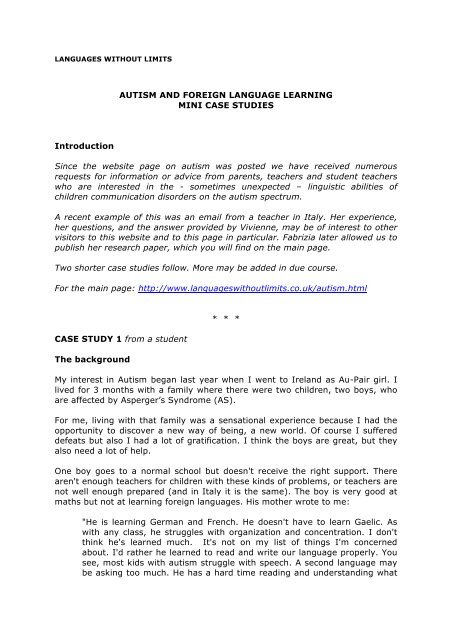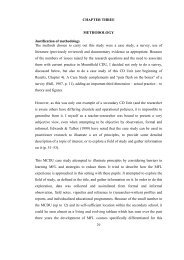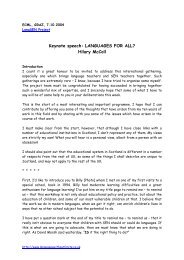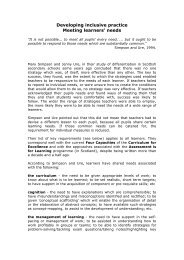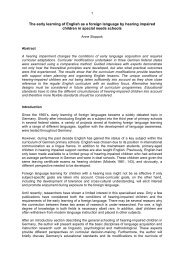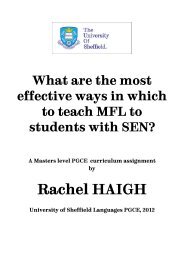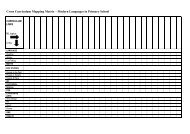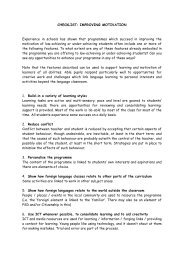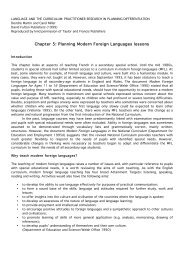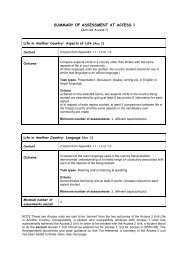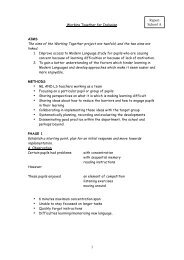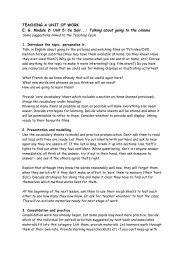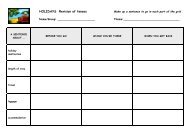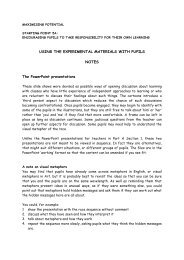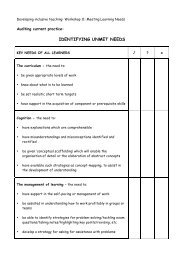autism and foreign language learning - Languages Without Limits
autism and foreign language learning - Languages Without Limits
autism and foreign language learning - Languages Without Limits
Create successful ePaper yourself
Turn your PDF publications into a flip-book with our unique Google optimized e-Paper software.
LANGUAGES WITHOUT LIMITS<br />
AUTISM AND FOREIGN LANGUAGE LEARNING<br />
MINI CASE STUDIES<br />
Introduction<br />
Since the website page on <strong>autism</strong> was posted we have received numerous<br />
requests for information or advice from parents, teachers <strong>and</strong> student teachers<br />
who are interested in the - sometimes unexpected – linguistic abilities of<br />
children communication disorders on the <strong>autism</strong> spectrum.<br />
A recent example of this was an email from a teacher in Italy. Her experience,<br />
her questions, <strong>and</strong> the answer provided by Vivienne, may be of interest to other<br />
visitors to this website <strong>and</strong> to this page in particular. Fabrizia later allowed us to<br />
publish her research paper, which you will find on the main page.<br />
Two shorter case studies follow. More may be added in due course.<br />
For the main page: http://www.<strong>language</strong>swithoutlimits.co.uk/<strong>autism</strong>.html<br />
CASE STUDY 1 from a student<br />
The background<br />
* * *<br />
My interest in Autism began last year when I went to Irel<strong>and</strong> as Au-Pair girl. I<br />
lived for 3 months with a family where there were two children, two boys, who<br />
are affected by Asperger’s Syndrome (AS).<br />
For me, living with that family was a sensational experience because I had the<br />
opportunity to discover a new way of being, a new world. Of course I suffered<br />
defeats but also I had a lot of gratification. I think the boys are great, but they<br />
also need a lot of help.<br />
One boy goes to a normal school but doesn't receive the right support. There<br />
aren't enough teachers for children with these kinds of problems, or teachers are<br />
not well enough prepared (<strong>and</strong> in Italy it is the same). The boy is very good at<br />
maths but not at <strong>learning</strong> <strong>foreign</strong> <strong>language</strong>s. His mother wrote to me:<br />
"He is <strong>learning</strong> German <strong>and</strong> French. He doesn't have to learn Gaelic. As<br />
with any class, he struggles with organization <strong>and</strong> concentration. I don't<br />
think he's learned much. It's not on my list of things I'm concerned<br />
about. I'd rather he learned to read <strong>and</strong> write our <strong>language</strong> properly. You<br />
see, most kids with <strong>autism</strong> struggle with speech. A second <strong>language</strong> may<br />
be asking too much. He has a hard time reading <strong>and</strong> underst<strong>and</strong>ing what
he just read (reading comprehension). He also has a hard time with<br />
writing (penmanship) <strong>and</strong> getting the thoughts from his brain to his h<strong>and</strong><br />
fast enough. Creative writing is a huge struggle. You see kids with <strong>autism</strong><br />
take everything literally. So <strong>learning</strong> another <strong>language</strong>, may be very<br />
difficult."<br />
The context<br />
The idea of writing a degree thesis about AS originates from my own experience<br />
with two brothers suffering from this autistic syndrome. In particular, the thesis<br />
considers the condition of the child with AS in primary school. We will describe<br />
the autistic syndrome <strong>and</strong> its linguistic singularities, but we will mainly take into<br />
account the difficulties that a child with AS has in <strong>learning</strong> a <strong>foreign</strong> <strong>language</strong>.<br />
The paper includes testimonies of parents <strong>and</strong> of teachers, my memoirs <strong>and</strong><br />
some items of law, as a help in better underst<strong>and</strong>ing the discomfort <strong>and</strong> the<br />
perseverance of the people who live with a child suffering from AS. The<br />
educational <strong>and</strong> didactic tips are drawn from several interviews with teachers<br />
who believe in the scholastic success of our special boys.<br />
I'd like to be a good teacher in the future, a teacher who can help her students<br />
in <strong>learning</strong> a <strong>foreign</strong> <strong>language</strong>, students with <strong>learning</strong> disabilities as well.<br />
The questions<br />
I'm asking you help because I'd like to have detailed information about the<br />
acquisition of a <strong>foreign</strong> <strong>language</strong> by children with AS. Can they learn a <strong>foreign</strong><br />
<strong>language</strong>? What problems do they face in <strong>learning</strong> a <strong>foreign</strong> <strong>language</strong>? <strong>and</strong> How<br />
can we, as teachers, help them?<br />
FB<br />
Vivienne’s response<br />
I presume you followed the link on Hilary's website to the research I did on a<br />
similar subject 6 years ago. At that time I was very closely involved in teaching<br />
French to a group of 12 secondary aged pupils in a "unit" within a secondary<br />
school specifically for young people with <strong>autism</strong> spectrum disorders. For the last<br />
4 years or so I have been in over all charge of a similar unit, <strong>and</strong> this has helped<br />
me step back a little to see the whole picture.<br />
You ask: can they learn a <strong>foreign</strong> <strong>language</strong>? With AS, absolutely, as their<br />
<strong>language</strong> skills, in the widest sense, are average or above, but there will always<br />
be a few for whom a <strong>language</strong> simply is a lot less interesting than mathematical<br />
problems! Those with high functioning <strong>autism</strong> (slightly different to AS) may have<br />
struggled to speak at all when young, <strong>and</strong> I think they find <strong>language</strong> generally<br />
more difficult.<br />
Their problems <strong>learning</strong> a <strong>language</strong> relate to motivation (like many other pupils).<br />
The more "h<strong>and</strong>s on", fun <strong>and</strong> relevant to what they are interested in, the<br />
better. If at primary level they like the Italian equivalent of Thomas the Tank<br />
Engine, then work with your own version of that! Very few with AS don't like<br />
computers, but a lot dislike writing (even though they can write), so use<br />
computers to engage more reluctant children. Be very specific about what you
want them to learn <strong>and</strong> exactly when the day's <strong>learning</strong> will be finished; always<br />
give instructions visually as well as verbally; deal with environmental issues<br />
which can totally distract them, - room too warm, buzzing light fitting, door not<br />
closed properly, chairs out of line <strong>and</strong> so on.<br />
Re. creative writing: This is challenging for those on the spectrum, but it is not<br />
relevant at the early stages of <strong>learning</strong> a <strong>language</strong> when everything should be<br />
simply presented <strong>and</strong> when doing things literally is good! I have found that if<br />
pupils hear a "good" accent in the <strong>foreign</strong> <strong>language</strong> they are likely to copy it in<br />
quite a literal way, without worrying what their friends might think about them<br />
sounding authentic!<br />
So it's not so much a question of teaching them in an entirely different way to<br />
other pupils. True, some may require a little longer to process what you're<br />
asking them, so keep instructions short. But generally these pupils will do well<br />
where other issues (as I mentioned above) are dealt with <strong>and</strong> teaching methods<br />
are multi-sensory <strong>and</strong> straightforward, with some humour from time to time to<br />
keep them engaged.<br />
VW<br />
Footnote<br />
When we approached the boy’s mother for permission to post this on the<br />
website she added some recent information:<br />
My son just had his teacher conferences. His French teacher raved about him!<br />
She absolutely loves him <strong>and</strong> is so impressed by his knowledge of the French<br />
<strong>language</strong>. She's astounded by how he can recite all the numbers in French<br />
(again, anything mathematical). I was so surprised, but you know, the more I<br />
think about it, it makes sense. He is very verbal based in <strong>learning</strong>. French is<br />
taught nearly all verbally. He does great on all verbal test answer <strong>and</strong> questions.<br />
His spelling of the <strong>language</strong> needs help, but that's to be expected. So, in<br />
looking back at my comments, I'm pleasantly wrong to assume that he wouldn't<br />
be good at <strong>learning</strong> another <strong>language</strong>. He's now a star pupil!<br />
* * *<br />
CASE STUDY 2 from a parent<br />
My son is 8 years old <strong>and</strong> lives with <strong>autism</strong>. We have used a range of different<br />
therapies for all but two years of his life. The reason for my writing is that just in<br />
the last week we have come to realize that he has an underst<strong>and</strong>ing of French<br />
<strong>and</strong> Spanish that we had no knowledge of. He has in the last few months been<br />
changing the <strong>language</strong> on the videos he has been watching to French, Chinese,<br />
Spanish, etc. but I was sure this was just to make his little sister get out of the<br />
room. I guess he has picked up a considerable amount from these videos;<br />
enough that his lead therapist <strong>and</strong> his mother <strong>and</strong> I have quizzed him <strong>and</strong> he<br />
has yet to be wrong. Even in the spelling he has been correct.
CASE STUDY 3 from a parent<br />
The following story was originally passed to us by the education officer at<br />
Eurotalk, a UK firm that publishes interactive <strong>language</strong> <strong>learning</strong> software:<br />
My remarkable son, who is autistic, has difficulty with expressive <strong>language</strong>,<br />
which makes it both ironic <strong>and</strong> fascinating that at the age of five he had an<br />
inexhaustible passion for <strong>foreign</strong> <strong>language</strong>s. Your products were perfectly geared<br />
toward my son's particular <strong>learning</strong> style: visual images in conjunction with<br />
audio <strong>and</strong> the written word. My son immediately absorbs that which he reads,<br />
<strong>and</strong> is able to crack reading codes without any formal reading instruction. I<br />
particularly appreciated that the words in your products are written in the native<br />
<strong>language</strong> rather than a phonetic translation. They helped him to speak,<br />
underst<strong>and</strong> <strong>and</strong> read in numerous <strong>language</strong>s. We heard so much more of his<br />
beautiful voice. He went from speaking very little to talking all day, in numerous<br />
<strong>foreign</strong> <strong>language</strong>s. He has other obsessions now, but I keep hoping his interest<br />
in <strong>language</strong>s will return.


